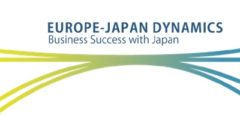Please enjoy fresh & hot news from Japan with comments by Europe-Japan Dynamics.
21 Apr. anipulated fuel consumption data of over 620’000 cars in four models
on the 20th that the company manipulated
Comments: There must be a long lasting management problems in the company as the data manipulation is the last thing that may happen in the production process.
22 Apr. Releasing the digital textbook to schools from 2020, said Ministry of Education, Culture, Sports, Science
The Ministry of Education, Culture, Sports, Science and Technology decided to lift the ban on digital textbook for primary, junior-high and high schools from 2020. The Ministry expects the digital textbook to efficient enable learning integrated with sound and video functions. The ministry plans to seek advice to a panel of experts today.
Comment: Teachers will need training to make use of the digital textbook efficiently, as children are digital savvy.
25 Apr. Toyota restarted assembly in 4 factories in Tokai and Tohoku regions, after stopping production in 15 factories after the Kumamoto earthquake
Toyota Motor Corporation reopened the assembling of the vehicle in four factories in Tokai and Tohoku regions, including Tsutsumi ground of Toyota-shi, Aichi ken. The company stopped the assembly in 15 factories in Japan after the Kumamoto earthquake, due to lack of supply of door parts produced in Kumamoto ken.
Comment: One week after the earthquake, what a prompt recovery it is!
26 Apr. The National Police Agency to start operations of the security intelligence center as one of the measures of counterterrorism
The National Police Agency is to start operations of the “Internet OSINT (Open Source Intelligence) Center” to automatically collect and analyze information found over the Internet related to terrorism. The center is one of the measures of the counterterrorism by improving ability to collect and analyse information as a measure of counterterrorism, against background of an increasing terrorism in Europe such as those undertaken by extremist groups such as the Islamic State (IS).
Comment: Hope that Japan may contribute to the security intelligence to prevent terrorism.
28 Apr. Reduction of 7,350,000 employment as a result of introduction of AT and Robots, according to “the fourth Industrial Revolution”
“- – that the employment in 2030 will be less than the one today by 7,350,000 jobs. This would be due to the automation enabled by the artificial intelligence (AI) and the robot technologies, etc. The Ministry of Economy, Trade and Industry (METI) experimentally calculated the influence of “the fourth Industrial Revolution” brought by AI or big data brought in terms of the number of the employment. On the other hand, METI also says that the employment decrease could be 1,610,000, if the new employment would be created as a result of restructuring.
Comment: Job decrease or creation is a complex subject. We must create new business opportunities in those areas which only human beings can do.
29 Apr. Smartphones become TV at disaster, TV stations delivered special programs of the earthquake via the air and Internet
Hundreds of small level of earthquakes still continue in Kumamoto, and about 40.000 people live as evacuees. While the TV stations broadcasted useful information minute by minute, many people cannot watch TV in such environment because of the
Comment: It was great that the Internet infrastructure was not shut down in the Kumamoto earthquake case. This experience demonstrate us how important it is to maintain the infrastructure of information in disaster areas.
2 May, G7 Energy Ministerial Meeting ended with “Kitakyusyu initiative”
The Ministerial meeting of Energy Secretaries of seven major economies (G7) ended with a joint communique “Kitakyusyu initiative”, that emphasized the importance of continued investment in oil and gas field developments, and creation of a transparent market of natural gas.
Comment: Stable energy supply through transparent markets is critical to the world economy.
3 May, “Will put in place an additional monetary policy, if needed”, said Mr. Kuroda, Governor of the Bank of Japan, upon an increasing value of yen
Following an increasing value of yen, Mr. Haruhiko Kuroda, the Governor of the Bank of Japan stated press, “My decision is unchanged to take additional monetary policy without hesitation if I judge it necessary to achieve the objective of price stability of 2% “. He said that in Frankfurt where he was visiting to attend a general meeting of the Asian Development Bank (ADB).
Comment: The value of yen is high, when the shape price of Japanese companies is low. It’s a tricky situation.
4 May, Objection to the targeted monitoring of currency exchange rate by the US, unexpected debate by the Finance Ministers of Japan, China and Korea
The Finance Ministers and Governors of the central banks of Japan, China and Korea discussed the US designation of these countries as targets of monitoring in its monetary policy though this issue was not in the original agenda of their meeting in Frankfurt held on the 3rd . Minister of Finance of Japan, Taro Aso, said that the Japanese exchange policy would not be affected by the designation by the US.
Comments: It is likely that the Japanese exchange policy would take into account the US designation of Yen as a currency to monitor, despite the initial reaction by Mr. Aso.
- All the news items are picked up from “Asahi Digital”, and summarized and translated by Europe-Japan Dynamics. The articles are not an official translation by the Asahi Newspaper.
